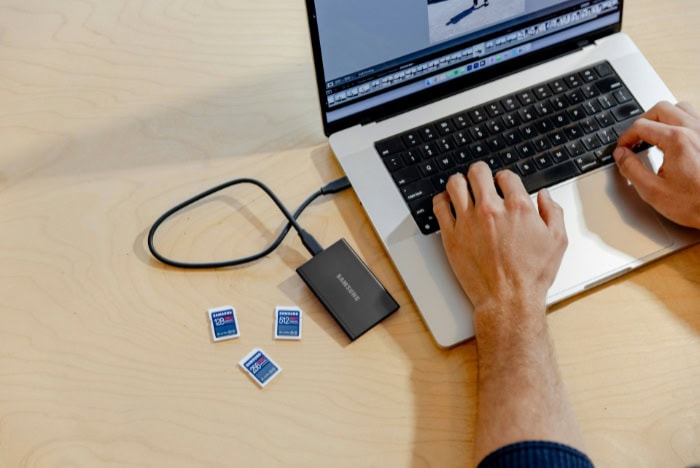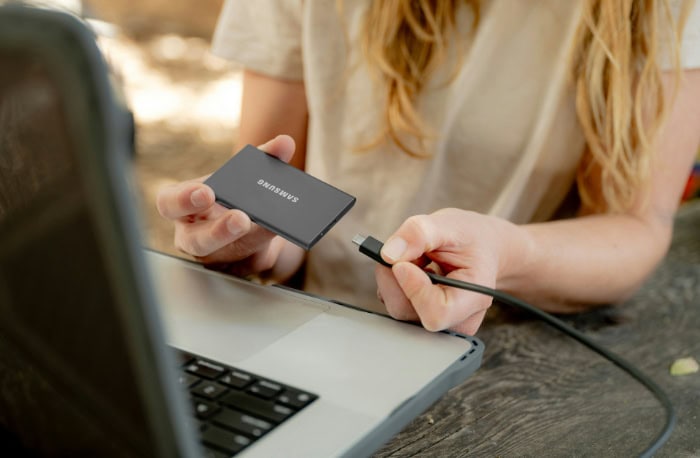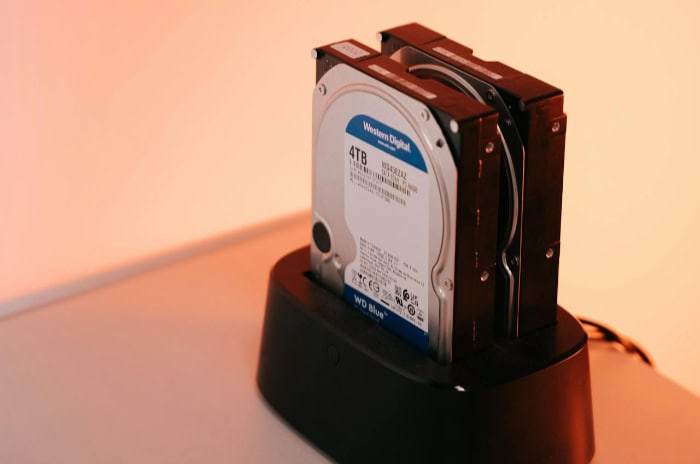Portable vs. External Hard Drives: Data Storage Made Easy

Modern technology users face a critical choice between portable and external hard drives for their storage needs. Both options serve distinct purposes, offering unique advantages for different scenarios and user requirements.
Portable hard drives excel in mobility and convenience, fitting easily into bags and pockets for data transport between locations. External hard drives, particularly desktop models, provide massive storage capacity and robust backup solutions for home or office use.
Selecting the right storage solution impacts productivity, data security, and overall convenience. Beyond simple storage capacity, factors like power requirements, transfer speeds, and durability play vital roles in determining which drive type best suits specific needs.
Portability vs Storage Capacity
Storage solutions present users with a fundamental trade-off between mobility and capacity. This balance shapes how effectively users can manage their data while meeting their specific workflow requirements.
Both portable and desktop external drives offer distinct advantages, making the choice highly dependent on individual needs and usage patterns.
The Mobility Advantage
Portable hard drives excel in situations requiring frequent movement between locations. These compact devices typically weigh between 150-300 grams and measure roughly the size of a deck of cards, making them perfect companions for mobile professionals, students, and travelers.
Their lightweight design allows users to carry substantial amounts of data without adding significant bulk to their bags or briefcases.
The mobility benefits extend beyond mere physical transportation. Portable drives can quickly connect to different devices without requiring additional power sources or setup time.
This plug-and-play functionality proves invaluable for professionals who frequently switch between workstations or need to share large files with colleagues across different locations.
Modern portable drives also incorporate robust protection features to handle the rigors of daily transport. Many models include shock-resistant casings, reinforced USB ports, and protective rubber bumpers.
These design elements ensure data safety even when the drive experiences minor bumps or drops during regular use.
Maximizing Storage Space
Desktop external drives prioritize storage capacity over portability, offering massive space for data-intensive applications. Current models can store up to 20TB or more, providing ample room for extensive media libraries, professional video projects, or comprehensive system backups.
This expanded capacity makes them ideal for creative professionals working with large media files or businesses requiring extensive data archiving capabilities.
The larger form factor of desktop drives allows manufacturers to implement advanced storage technologies, including multiple platters, enhanced cooling systems, and sophisticated data management features.
Some models incorporate multiple drives in RAID configurations, providing additional redundancy and performance benefits for critical data storage needs.
Aligning Storage Solutions with Workflow
Choosing between portability and capacity requires careful consideration of daily workflow patterns. Content creators working with 4K video might require both types – a portable drive for ongoing projects and client presentations, plus a desktop drive for archiving completed work.
Similarly, photographers might use portable drives during shoots but transfer finished albums to desktop drives for long-term storage.
Professional environments often benefit from a hybrid approach. For example, graphic designers might maintain their primary work files on a portable drive for client meetings and remote work, while keeping larger asset libraries on desktop drives at their main workstation.
This strategy combines the convenience of mobility with the security of comprehensive storage.
The frequency of data access also influences the choice. Users who regularly need to access and modify their stored data might prefer portable drives for immediate availability.
Conversely, those primarily focused on data archival or periodic backups might find desktop drives more suitable, as these typically remain connected to a primary workstation.
Storage requirements can also fluctuate over time. Some users start with portable drives for basic storage needs but gradually transition to desktop drives as their data collection grows.
Others maintain both types, using portable drives for active projects and desktop drives for completed work or archival purposes. This flexible approach allows users to adapt their storage strategy as their needs evolve, ensuring optimal data management across different scenarios and requirements.
Power Sources and Connection Technologies

The effectiveness of external storage devices heavily depends on their power delivery systems and connection interfaces. These technical aspects significantly influence performance, convenience, and overall usability of both portable and desktop external drives.
USB Power Delivery Systems
Portable hard drives utilize USB bus power, drawing electricity directly from the computer or device they’re connected to. This elegant solution eliminates the need for separate power cables or adapters, making them extremely convenient for mobile use.
The USB connection serves dual purposes – transferring data while simultaneously providing necessary power for drive operation.
Most modern portable drives require 5V of power, which standard USB ports easily supply. USB 3.0 and newer specifications can deliver up to 900mA of current, sufficient for operating even high-performance portable SSDs.
This power efficiency makes portable drives particularly suitable for use with laptops and tablets, as they don’t significantly impact the host device’s battery life.
External Power Supplies and Performance
Desktop external drives typically incorporate separate power adapters, which might seem less convenient but offer distinct advantages. These dedicated power supplies enable drives to operate more powerful motors and multiple platters, resulting in higher storage capacities and improved performance.
The consistent power delivery also supports additional features like multiple drive bays, LED status displays, and advanced cooling systems.
The external power supply allows desktop drives to maintain stable performance during intensive operations, such as continuous backup processes or high-speed data transfers.
Unlike USB-powered devices, which might experience power fluctuations under heavy loads, desktop drives maintain consistent power delivery regardless of the operation being performed.
Modern Connection Standards
Contemporary external drives support various connection standards, each offering different speeds and compatibility options. USB 3.0 (also known as USB 3.2 Gen 1) provides transfer speeds up to 5 Gbps, while USB 3.1 (USB 3.2 Gen 2) doubles this to 10 Gbps.
These speeds prove sufficient for most users, handling large file transfers and routine backups efficiently.
USB-C represents a significant advancement in connectivity, offering improved convenience through its reversible connector design. Many modern portable drives feature USB-C ports, which support various protocols including USB 3.2 Gen 2×2 (20 Gbps) and Thunderbolt 3 or 4 (40 Gbps).
This versatility allows users to achieve maximum transfer speeds when connected to compatible devices while maintaining backward compatibility with older USB standards.
Thunderbolt technology, particularly prevalent in professional-grade external drives, delivers exceptional performance for demanding applications. Thunderbolt 3 and 4 connections support speeds up to 40 Gbps, making them ideal for video editing, 3D rendering, and other data-intensive tasks.
These interfaces also support daisy-chaining multiple devices and can even power larger external drives directly, though many desktop models still utilize separate power supplies for optimal performance.
The choice of connection standard affects not only transfer speeds but also compatibility across different devices. While USB maintains broad compatibility across various computers and operating systems, Thunderbolt availability might be limited on some devices, particularly non-Apple computers.
Users should consider their existing hardware ecosystem when selecting drives with specific connection types to ensure optimal compatibility and performance.
Some manufacturers offer drives with multiple connection options, including both USB-C and traditional USB-A ports, often providing appropriate cables for each. This flexibility allows users to connect their drives to various devices without requiring additional adapters, enhancing the overall usability and convenience of the storage solution.
Performance, Durability, and Long-Term Reliability

The practical value of external storage devices depends heavily on their performance capabilities, physical durability, and reliability over extended periods. These factors vary significantly between different drive technologies and form factors, affecting their suitability for specific use cases.
Speed and Performance Metrics
Storage speed creates a notable distinction between SSD (Solid State Drive) and HDD (Hard Disk Drive) technologies. Portable SSDs demonstrate remarkable performance advantages, achieving transfer speeds up to 2,000 MB/s through modern interfaces like USB 3.2 Gen 2×2 or Thunderbolt 3.
This superior speed allows users to transfer large files in seconds rather than minutes, making them excellent choices for creative professionals working with high-resolution media files.
Traditional HDDs, both portable and desktop variants, typically operate at speeds between 120-160 MB/s. While this might seem modest compared to SSDs, these speeds remain perfectly adequate for regular backups, document storage, and media libraries.
Desktop external HDDs often incorporate larger cache memories and optimized firmware, helping to maintain consistent performance during extended operations.
Physical Durability Considerations
The construction and internal components of drives significantly impact their resistance to physical stress. Portable SSDs excel in this aspect, containing no moving parts that could be damaged by drops or vibrations.
Many portable SSDs can withstand falls from heights of up to two meters without data loss, making them highly reliable for users who frequently transport their drives.
Traditional HDDs face greater challenges regarding physical durability. Their internal mechanical components, including spinning platters and read/write heads, make them susceptible to damage from impacts or sudden movements.
Desktop external HDDs minimize this risk through their stationary design, often incorporating shock-absorbing materials and protective casings. However, they should still be handled with care during any necessary relocation.
Manufacturers often enhance the durability of portable HDDs through various protective measures. Rubber bumpers, reinforced enclosures, and internal shock sensors help safeguard data during transport.
Long-Term Reliability Analysis
The reliability of external storage devices varies based on both technology type and usage patterns. SSDs generally demonstrate excellent reliability due to their lack of mechanical components.
However, they do have finite write endurance – each memory cell can only undergo a certain number of write cycles before deteriorating. Modern SSDs typically offer write endurance ratings sufficient for 5-10 years of regular use.
HDDs rely on mechanical components that experience wear over time. Desktop external HDDs, operating in controlled environments with stable power supplies and minimal movement, often maintain reliable performance for many years.
Their controlled operating conditions and robust cooling systems contribute to extended operational lifespans.
Usage patterns significantly affect drive reliability. Portable drives endure more stress through frequent connections, disconnections, and environmental changes.
Temperature fluctuations, physical movement, and varying power conditions can impact their longevity. Desktop drives benefit from consistent operating conditions but may suffer from continuous operation without proper cooling or maintenance.
Data integrity features also play a role in long-term reliability. Many external drives incorporate error correction capabilities, bad sector management, and health monitoring systems.
These technologies help maintain data integrity and warn users of potential drive failures before they occur. Some premium models include redundant storage options or RAID configurations, providing additional protection against data loss.
The choice between different drive technologies and form factors should consider both immediate performance needs and long-term reliability requirements.
Users handling sensitive data might prefer the robust construction of SSDs, while those focused on long-term storage might opt for desktop HDDs with their proven track record in continuous operation scenarios.
Cost Analysis and Value Proposition

Making a smart investment in external storage requires careful consideration of both immediate expenses and long-term value. The cost structure of external storage solutions varies significantly between portable and desktop options, with each offering distinct financial advantages for different usage scenarios.
Initial Purchase Considerations
Portable hard drives typically present lower upfront costs, particularly in the lower capacity ranges. A 1TB portable HDD might cost between $50-$70, making it an accessible option for users with modest storage needs.
Portable SSDs command higher prices, often starting at $100-$150 for 500GB models, reflecting their advanced technology and superior performance characteristics.
Desktop external drives present a different pricing structure. While their initial cost might seem higher, they offer substantial storage capacity that justifies the investment.
Entry-level desktop drives starting at 4TB typically range from $100-$150, providing significantly more storage space compared to similarly priced portable options.
Storage Economics: Cost Per Gigabyte
The cost per gigabyte metric reveals interesting patterns across different storage solutions. Desktop external HDDs consistently offer the most economical storage, often achieving prices below $0.02 per gigabyte for larger capacity models.
This efficiency makes them particularly attractive for users requiring substantial storage space, such as media collectors or professional content creators.
Portable HDDs occupy a middle ground, typically ranging from $0.03 to $0.05 per gigabyte. This moderate pricing reflects their balanced approach between capacity and convenience.
Portable SSDs represent the premium segment, with costs ranging from $0.10 to $0.20 per gigabyte, though prices continue to decrease as manufacturing technology improves.
Long-Term Financial Benefits
The true value of external storage extends beyond initial purchase prices. Desktop external drives often prove more cost-effective over time, particularly for users with expanding storage needs.
Their larger capacities reduce the need for multiple device purchases, while their robust construction and stable operating conditions contribute to longer service life.
Portable SSDs, despite higher upfront costs, can deliver excellent long-term value for specific use cases. Their superior durability reduces replacement frequency, while faster transfer speeds save valuable time during daily operations.
For professionals whose work involves frequent data transfers or active file editing, the time saved can translate into tangible productivity benefits.
Maintenance and operating costs also factor into long-term value. Desktop drives require minimal additional investment beyond their purchase price, though their power consumption should be considered.
Portable drives, particularly SSDs, typically incur lower maintenance costs due to their resilient design and minimal power requirements.
The upgrade path represents another financial consideration. Users starting with smaller portable drives might need to purchase additional units as their storage needs grow.
Conversely, desktop external drives often provide sufficient capacity headroom for future expansion, potentially reducing the need for supplementary storage purchases.
Protection features and warranty coverage influence the overall value proposition. Many premium external drives include advanced backup software, encryption capabilities, and extended warranty periods.
While these features might increase initial costs, they provide valuable data protection and peace of mind, potentially preventing costly data recovery scenarios.
The optimal choice depends heavily on individual circumstances and usage patterns. Users requiring mobility might find greater value in portable solutions despite higher per-gigabyte costs.
Those focused on maximum storage capacity often benefit from the economic efficiency of desktop external drives, especially when considering long-term storage needs and potential expansion requirements.
Conclusion
Portable and external hard drives serve distinct purposes in modern data storage needs. Portable drives excel through mobility and convenience, offering reliable storage solutions for users who frequently transport data between locations.
Their compact design and USB power capabilities make them ideal companions for mobile professionals and students. External desktop drives provide massive storage capacity and consistent performance, making them perfect for comprehensive backups and media libraries.
Storage requirements vary significantly among users. Creative professionals might benefit from both types – portable SSDs for active projects and desktop drives for archives.
Home users focused on media collections and backups often find desktop drives most cost-effective. Power delivery, connection options, and durability considerations play vital roles in determining suitable storage solutions for specific scenarios.
Price considerations balance initial costs against long-term value. While portable drives offer lower entry prices, desktop models typically provide better cost per gigabyte ratios.
Both options continue advancing technologically, offering improved speeds, reliability, and data protection features that enhance their value proposition for different user groups.


